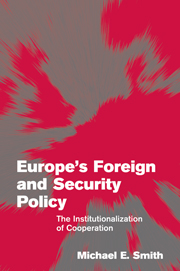Book contents
- Frontmatter
- Contents
- List of tables
- Acknowledgments
- List of abbreviations
- Introduction: foreign and security policy in the European Union
- Part I Institutions and foreign policy cooperation: the theoretical and empirical terrain
- Part II The institutionalization of cooperation
- 3 Origins: intergovernmentalism and European Political Cooperation
- 4 Information-sharing and the transgovernmental EPC network
- 5 Norms, rules, and laws in European foreign policy
- 6 Organizations and European foreign policy
- 7 Toward governance: the Common Foreign and Security Policy
- Part III Residual institutional issues
- Conclusion: beyond the CFSP: institutions, defense, and the European identity
- References
- Index
4 - Information-sharing and the transgovernmental EPC network
Published online by Cambridge University Press: 21 January 2010
- Frontmatter
- Contents
- List of tables
- Acknowledgments
- List of abbreviations
- Introduction: foreign and security policy in the European Union
- Part I Institutions and foreign policy cooperation: the theoretical and empirical terrain
- Part II The institutionalization of cooperation
- 3 Origins: intergovernmentalism and European Political Cooperation
- 4 Information-sharing and the transgovernmental EPC network
- 5 Norms, rules, and laws in European foreign policy
- 6 Organizations and European foreign policy
- 7 Toward governance: the Common Foreign and Security Policy
- Part III Residual institutional issues
- Conclusion: beyond the CFSP: institutions, defense, and the European identity
- References
- Index
Summary
Given the vague provisions of the Luxembourg Report it rapidly became clear that EPC's participants would have to improvise their cooperation. As we have seen, although senior government officials played a leading role during EPC's formative years, even then the system involved an embryonic lower-level infrastructure – the Political Committee, European Correspondents, and working groups – to assist foreign ministers with foreign policy coordination. Fundamentally, EPC at this time was little more than a system of “regular exchanges of information and consultation” on “great international problems,” primarily involving periodic summits among EU member governments. This aspect of European foreign policy reflects one of the most fundamental functions of institutions: information-sharing. As May (1984) has pointed out, perspective-taking alone cannot always enable actors to predict each other's behaviors, and predictable behavior is the essence of cooperation. In a world of uncertainty regarding the behavior of states, institutional mechanisms that make it easier for states to communicate with each other are highly valued.
The cooperation-inducing effects of regular communication can vary, ranging from confidence-building (at a minimum) to providing a shared understanding of, and potential solutions to, certain problems (at a maximum). However, there can be an enormous amount of variation regarding the ends and means of communication. With respect to EU foreign policy, I stress four aspects of communication: the actors involved, the types of information they share, the channels through which this information is shared, and the effects of that communication on cooperation and institution-building.
- Type
- Chapter
- Information
- Europe's Foreign and Security PolicyThe Institutionalization of Cooperation, pp. 90 - 116Publisher: Cambridge University PressPrint publication year: 2003

